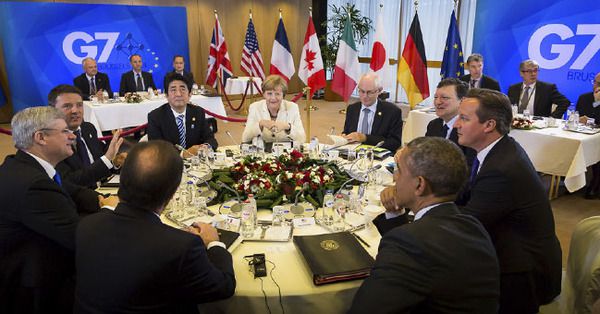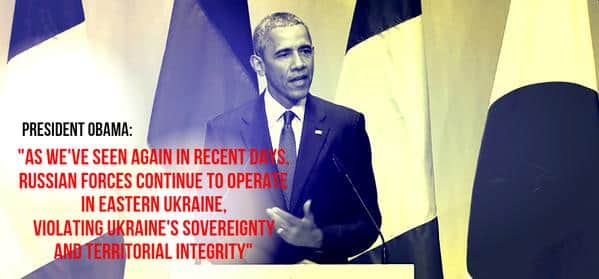The meeting of the G7, on June 7–8 2015, in Germany, took a place in the Schloss Elmau hotel high in the southern German Alps.
PHOTO:German Missions in the US
In the G7 took part the leaders of the seven G7 member states, and representatives of the European Union: President of the European Council Donald Tusk, Japanese Prime Minister Shinzo Abe, Canada’s Prime Minister Stephen Harper, U.S. President Barack Obama, German Chancellor Angela Merkel, French President Francois Hollande, British Prime Minister David Cameron, Italian Prime Minister Matteo Renzi and President of the European Commission Jean-Claude Juncker.
G-7 Leaders’ Declaration says about the ways to find a solution to the conflict in Eastern Ukraine
“We reiterate our condemnation of the illegal annexation of the Crimean peninsula by the Russian Federation and reaffirm our policy of its non-recognition.”
“We reiterate our full support for the efforts to find a diplomatic solution to the conflict in eastern Ukraine, particularly in the framework of the Normandy format and the Trilateral Contact Group. We welcome the OSCE’s key role in finding a peaceful solution. We call on all sides to fully implement the Minsk agreements including the Package of Measures for their implementation signed on 12 February 2015 in Minsk, through the established Trilateral Contact Group and the four working groups. We are concerned by the recent increase in fighting along the line of contact; we renew our call to all sides to fully respect and implement the ceasefire and withdraw heavy weapons. We recall that the duration of sanctions should be clearly linked to Russia’s complete implementation of the Minsk agreements and respect for Ukraine’s sovereignty. They can be rolled back when Russia meets these commitments. However, we also stand ready to take further restrictive measures in order to increase cost on Russia should its actions so require. We expect Russia to stop trans-border support of separatist forces and to use its considerable influence over the separatists to meet their Minsk commitments in full.”
“We commend and support the steps the Ukrainian government is taking to implement comprehensive structural reforms and urge the Ukrainian leadership to decisively continue the necessary fundamental transformation in line with IMF and EU commitments. We reaffirm our commitment to working together with the international financial institutions and other partners to provide financial and technical support as Ukraine moves forward with its transformation. We ask the G7 Ambassadors in Kiev to establish a Ukraine support group. Its task will be to advance Ukraine´s economic reform process through coordinated advice and assistance.”
G7 leaders discussed also problems in the Energy sector:
“Notably, we reaffirm our support for Ukraine and other vulnerable countries in their ongoing efforts to reform and liberalize their energy systems and reiterate that energy should not be used as a means of political coercion or as a threat to security. We welcome the intention of the Ukrainian government to reduce energy-related subsidies and invest in energy efficiency programmes.”
President Obama in Press Conference after G7 Summit stated that G7 leaders would continue to provide economic support and technical assistance to Ukraine.
“With respect to security, the G7 remains strongly united in support for Ukraine. We’ll continue to provide economic support and technical assistance that Ukraine needs as it moves ahead on critical reforms to transform its economy and strengthen its democracy. As we’ve seen again in recent days, Russian forces continue to operate in eastern Ukraine, violating Ukraine’s sovereignty and territorial integrity. This is now the second year in a row that the G7 has met without Russia -— another example of Russia’s isolation -— and every member of the G7 continues to maintain sanctions on Russia for its aggression against Ukraine.”
“On Ukraine and Russia and Minsk, there is strong consensus that we need to keep pushing Russia to abide by the terms of the Minsk agreement; we need to continue to support and encourage Ukraine to meet its obligations under Minsk — that until that’s completed, sanctions remain in place.”







